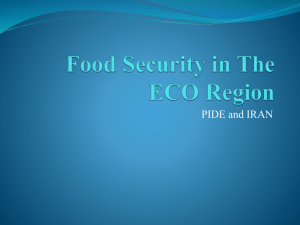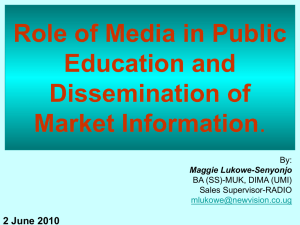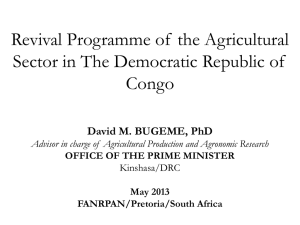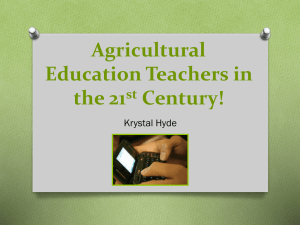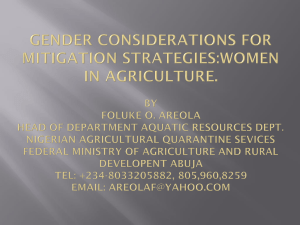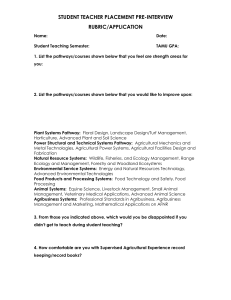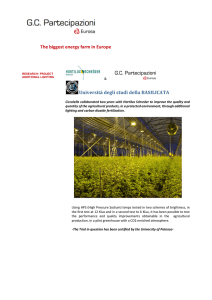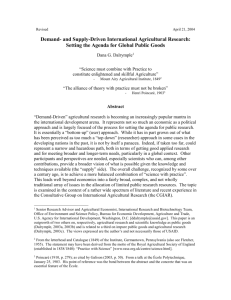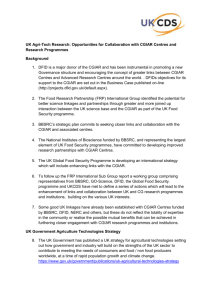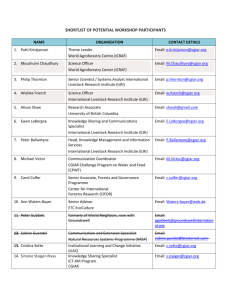Word version
advertisement
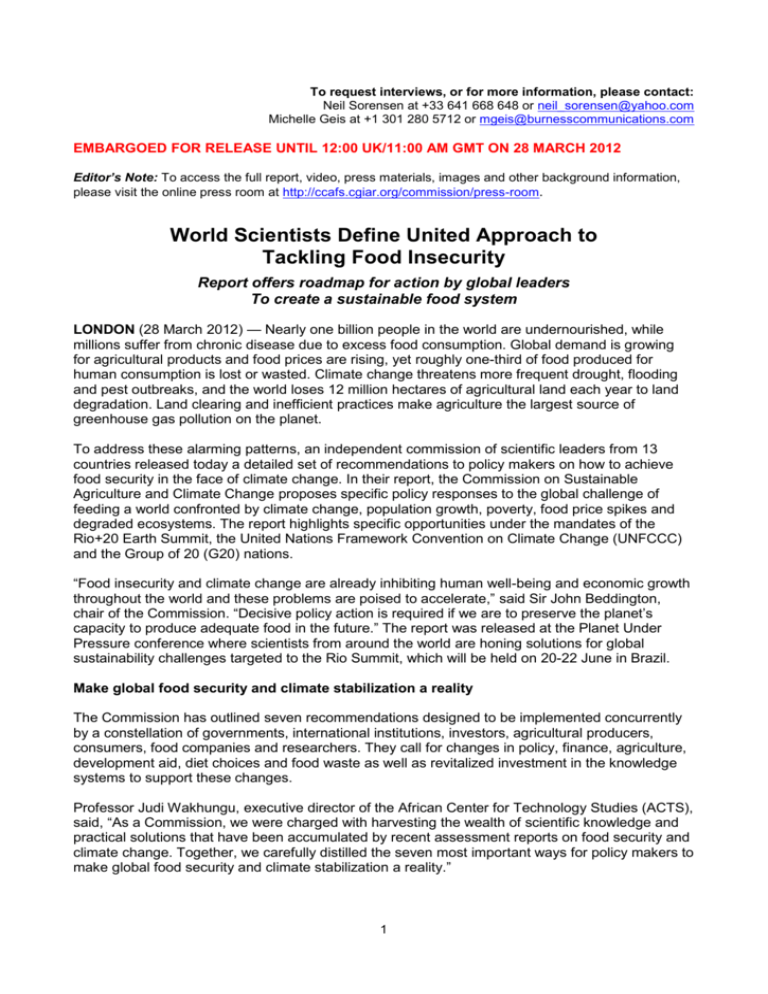
To request interviews, or for more information, please contact: Neil Sorensen at +33 641 668 648 or neil_sorensen@yahoo.com Michelle Geis at +1 301 280 5712 or mgeis@burnesscommunications.com EMBARGOED FOR RELEASE UNTIL 12:00 UK/11:00 AM GMT ON 28 MARCH 2012 Editor’s Note: To access the full report, video, press materials, images and other background information, please visit the online press room at http://ccafs.cgiar.org/commission/press-room. World Scientists Define United Approach to Tackling Food Insecurity Report offers roadmap for action by global leaders To create a sustainable food system LONDON (28 March 2012) — Nearly one billion people in the world are undernourished, while millions suffer from chronic disease due to excess food consumption. Global demand is growing for agricultural products and food prices are rising, yet roughly one-third of food produced for human consumption is lost or wasted. Climate change threatens more frequent drought, flooding and pest outbreaks, and the world loses 12 million hectares of agricultural land each year to land degradation. Land clearing and inefficient practices make agriculture the largest source of greenhouse gas pollution on the planet. To address these alarming patterns, an independent commission of scientific leaders from 13 countries released today a detailed set of recommendations to policy makers on how to achieve food security in the face of climate change. In their report, the Commission on Sustainable Agriculture and Climate Change proposes specific policy responses to the global challenge of feeding a world confronted by climate change, population growth, poverty, food price spikes and degraded ecosystems. The report highlights specific opportunities under the mandates of the Rio+20 Earth Summit, the United Nations Framework Convention on Climate Change (UNFCCC) and the Group of 20 (G20) nations. “Food insecurity and climate change are already inhibiting human well-being and economic growth throughout the world and these problems are poised to accelerate,” said Sir John Beddington, chair of the Commission. “Decisive policy action is required if we are to preserve the planet’s capacity to produce adequate food in the future.” The report was released at the Planet Under Pressure conference where scientists from around the world are honing solutions for global sustainability challenges targeted to the Rio Summit, which will be held on 20-22 June in Brazil. Make global food security and climate stabilization a reality The Commission has outlined seven recommendations designed to be implemented concurrently by a constellation of governments, international institutions, investors, agricultural producers, consumers, food companies and researchers. They call for changes in policy, finance, agriculture, development aid, diet choices and food waste as well as revitalized investment in the knowledge systems to support these changes. Professor Judi Wakhungu, executive director of the African Center for Technology Studies (ACTS), said, “As a Commission, we were charged with harvesting the wealth of scientific knowledge and practical solutions that have been accumulated by recent assessment reports on food security and climate change. Together, we carefully distilled the seven most important ways for policy makers to make global food security and climate stabilization a reality.” 1 The Commission’s recommendations encourage significantly raising the level of global investment in sustainable agriculture and food systems in the next decade; sustainably intensifying agricultural production on the existing land base while reducing greenhouse gas emissions; and reducing losses and waste in the food system. “It's past time to realize that farms of every size all over the world are fundamental to human nutrition and economic well-being, but they are also facing critical choices with significant implications for the way we manage the planet for long term sufficiency,” according to U.S. Commissioner Professor Molly Jahn of the University of Madison-Wisconsin. Mobilize science and policy for sustainable agricultural practices Alternative agricultural practices have the potential to deliver benefits for both adaptation and mitigation of climate change and the Commission has urged the UNFCCC to establish a work program that addresses these issues together under the Subsidiary Body for Scientific and Technological Advice (SBSTA). “Without an integrated SBSTA work program for agriculture, we risk crafting fragmented global climate policy,” says Commission Vice-Chair Dr. Mohammed Asaduzzaman, Research Director at the Bangladesh Institute of Development Studies. “Countries like Bangladesh clearly need support for climate-resilient agriculture, but we also need a serious global commitment to reducing greenhouse gas emissions, including in the agriculture sector.” Sea level rise threatens major areas of Bangladesh, which already experiences significant environmental migration. The Commission’s report cites recent evidence that closing the gap between potential and actual yields for 16 major crops could increase productivity by more than 50 percent. “To produce enough food for our rapidly growing population, much greater investment is needed to dramatically increase agricultural yields now and in the long-term,” Commissioner Dr. Nguyen Van Bo, president of the Viet Nam Academy of Agricultural Science. “In Viet Nam, we have established model programs to boost rice productivity and quality, mitigate greenhouse gases and increase income for farmers.” Sustainably intensifying agricultural production on existing land, while reducing greenhouse gas emissions from agriculture, is one of the seven Commission recommendations. “There have been some impressive successes in sustainably boosting agricultural production, but there is a lot more to be done,” says Commissioner Dr. Carlos Nobre of the Brazilian Ministry of Science, Technology and Innovation. “Brazil has made strides in reducing poverty while protecting rainforests in the last seven years, but if we do not advance the science and practice of sustainable intensification, our forests and our farming economies will be at risk.” In China, nearly 400 kilograms of chemical fertilizer are used on every hectare of farmland. “We have an opportunity and a plan to stop unnecessary greenhouse gas emissions from inefficient farming practices,” said Commissioner Professor Lin Erda, director of the Research Centre of Agriculture and Climate Change at the Chinese Academy of Agricultural Sciences. “We are mobilizing public policies and budgets towards low-emission crop breeds and conservation of land, water and energy.” In Mexico, agriculture accounts for 77 percent of domestic water use, in part due to substantial subsidies applied to the price of water and electricity for irrigation. “We must redirect public subsidies to promote economically and environmentally sound farming practices that conserve finite natural resources,” says Commissioner Dr. Adrian Fernández of the Metropolitan University in Mexico. A comprehensive approach to reshaping food systems In addition to tackling agriculture, the Commission’s recommendations explicitly recognize the “demand side” of food insecurity. “If we don’t start to make use of the tools at our disposal to encourage eating choices that are good for people and the planet, we must resign ourselves to a 2 growing diet-related disease burden,” cautions Commissioner Dr. Marion Guillou, president of the French National Institute for Agricultural Research (INRA). The Commission also calls for policies and programs explicitly designed to empower vulnerable populations. “Enabling smallholder farmers to invest in the productive capacity of their land has been shown to create economic and environmental resilience,” reports Commissioner Professor Tekalign Mamo, state minister and advisor to the Ethiopian Minister of Agriculture. “We must build on what we’ve learned by expanding such programs, otherwise communities will remain vulnerable to a downward spiral of lost productivity, poverty and food insecurity.” “Recent legislation in India has shown that poverty alleviation programs can also address environmental sustainability objectives,” says Indian Commissioner Dr. Rita Sharma, secretary of the National Advisory Council in India. “The 2006 Mahatma Gandhi National Rural Employment Guarantee Act helps rural farmers and households to manage risk while delivering climate change resilience and mitigation through projects that recharge groundwater, enhance soil fertility and increase biomass.” The need for improved data and decision support for land managers and policy makers is underscored by the Commission. “Smart, sustainable food production requires that we upgrade our knowledge of water, soils, energy, meteorology, emissions, agricultural production and forests, and that we understand how these elements work together as a system,” says Australian Commissioner Dr. Megan Clark, chief executive of the Commonwealth Scientific and Industrial Research Organisation (CSIRO). “In Australia, researchers, farmers and data managers are working together to build an integrated capacity to deal with the inevitable trade-offs embedded in our decisions.” Decisive action to ensure a safe operating space for current and future generations The Commission’s report presents a stark picture of the challenges ahead and calls for significantly raising the level of global investment in sustainable agriculture and food systems in the next decade. For example, it urges stronger follow-through on the 2009 G8 L’Aquila commitments to provide USD 20 billion for agricultural development in poor countries and incorporating food security and sustainable agriculture programs into UNFCCC “Fast Start” funding. But it also provides examples of important progress, pointing to major investments such as the Adaptation Fund of the Kyoto Protocol and the €5.3 million climate-smart agriculture project in Malawi, Viet Nam and Zambia funded by the UN Food and Agriculture Organization and the European Commission. The report points to opportunities across the whole food supply chain to protect the environment and the bottom line. “Many public and private sector leaders are already taking steps to overcome technical, social, financial and political barriers to a sustainable food system,” says Dr. Bruce Campbell, director of the CGIAR Research Program on Climate Change, Agriculture and Food Security, which convened the Commission in February 2011. “The Commission’s work spells out who needs to do what to take these early efforts to the next level.” The report encourages continued progress under the G20 on 2011 agreements, including design of rapid response and insurance strategies to protect very poor populations from rising food prices or meager harvests, as well as improved market transparency through a new agriculture and energy database. At the Rio+20 Earth Summit, Commissioners urge governments to make financial commitments for regionally-based research, implementation, capacity building and monitoring to improve agriculture and food systems. The report also points to global agreements, such as World Trade Organization trade treaties, and initiatives, such as the United Nation’s HighLevel Taskforce on the Global Food Security Crisis, and also emphasizes the critical role of farmers and agribusinesses. 3 The Commission has created an animated video to illustrate why and how humanity must transform the way food is produced, distributed and consumed in response to changes in climate, global population, eating patterns and the environment. “To operate within a ‘safe space’ for people and the planet, we need to balance how much food we produce, how much we consume and waste and how much agriculture contributes to further climate change,” explains South African Commission Professor Bob Scholes of the Council for Scientific and Industrial Research (CSIR). The Commission is launching the video describing the intersection of these limits at the Planet Under Press Conference: http://bit.ly/SafeSpaceClimateFood The full list of commissioners, the final report document, and additional background, facts, images, and other materials can be found at http://ccafs.cgiar.org/commission ### The Commission on Sustainable Agriculture and Climate Change is an initiative of the CGIAR Research Program on Climate Change, Agriculture and Food Security (www.ccafs.cgiar.org), with additional support from the Global Donor Platform for Rural Development. The Commission brings together senior natural and social scientists working in agriculture, climate, food and nutrition, economics, and natural resources from Australia, Brazil, Bangladesh, China, Ethiopia, France, Kenya, India, Mexico, South Africa, the United Kingdom, the United States and Viet Nam to identify the policy changes and actions needed now to help the world achieve sustainable agriculture that contributes to food security and poverty reduction, and helps respond to climate change adaptation and mitigation goals. The Commission’s Action points (full details elaborated in Final Report document) 1. Integrate food security and sustainable agriculture into global and national policies 2. Significantly raise the level of global investment in sustainable agriculture and food systems in the next decade 3. Sustainably intensify agricultural production while reducing greenhouse gas emissions and other negative environmental impacts of agriculture 4. Target populations and sectors that are most vulnerable to climate change and food insecurity 5. Reshape food access and consumption patterns to ensure basic nutritional needs are met and to foster healthy and sustainable eating habits worldwide 6. Reduce loss and waste in food systems, particularly from infrastructure, farming practices, processing, distribution and household habits 7. Create comprehensive, shared, integrated information systems that encompass human and ecological dimensions The research discussed in the press release, the conclusions drawn and the opinions offered are those of individual speakers or research teams at the Planet Under Pressure conference. 4
